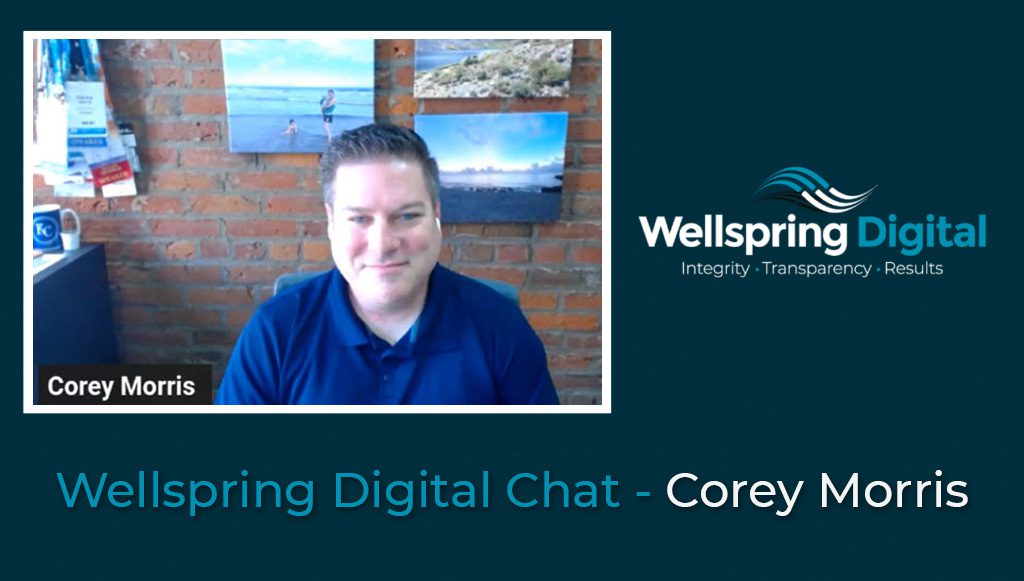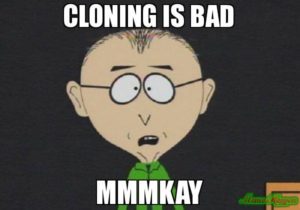If you’ve spent any time on Search Engine Land or Search Engine Journal, then you’re likely familiar with today’s guest. I have been a fan of his writing for some time now and I am excited to dig a little deeper today.

Corey is a seasoned vet, having nearly 20 years in this digital marketing industry (or circus depending on the day). I am always excited to talk to someone who has been doing this since the so-called good ole days. And maybe we can shed some light on the future.
In this chat, we dive into…
- Is SEO an Investment or an Expense?
- The Value of Engaged Digital Marketing Clients
- Digital Marketing MUST Start with Strategy
- AI’s Impact on SEO in the Near-Term
- Is AI Posing An Existential Crisis?
Ready? Let’s do this…
Digital Transcription (Edited for Readability)
Introductions
Jon-Mikel Bailey: Hi, everybody, I am Jon-Mikel Bailey, and welcome to the Wellspring Digital Chat, where, after a brief sweat lodge session with a group of really friendly druids, we came out and decided to have this conversation where we are going to uncover some of the ancient secrets of digital marketing and share them directly with you. So consider yourself fortunate. The sweat was great.
Yeah, so if you’ve spent any time on Search Engine Land or Search Engine Journal, which I hope you have because there’s great stuff there, then you’re likely familiar with today’s guest. I’ve been a fan of his writing for quite a while now. And I am very excited to dig a little deeper with him. So Corey, welcome. And please take a moment to introduce yourself to these wonderful people.
Corey Morris: Thanks, I appreciate it. Now, it’s awesome to have a chance to chat. And we talked about we’ll get into I’m sure some of the ancient aspects of SEO as well as the future ones. I am the president and CEO of a digital agency called Voltage. We’re based in Kansas City, Missouri. But our focus and our footprint is around the United States. I still consider myself an SEO at heart, which is why I continue to write for those publications. But have the privilege of running an agency here that focuses heavily on search under the digital marketing umbrella.
We do organic, paid, email marketing, social media, as well as web development, and branding and identity work as well. So those are really the three buckets we operate in. But I’ve had a great opportunity over way too many years now to engage in the digital marketing community and stay plugged in. And it’s one of the favorite things for me, it gives me energy in terms of whether it’s content like this and the chance to chat or in-person events, which I’m glad are back in a much bigger way. And to nerd out with my friends.
Jon-Mikel Bailey: Heck, yeah. So, you know, you’re one of the OG’s, as far as I’m concerned, one of the big hitters, the SEO OG’s. You’ve spent 15-plus years in this thing called digital marketing, which, let’s face it, that’s ancient in the relative scale of things. So I’m always excited to talk to someone who has been doing this since the so-called good old days. And maybe we can shed some light on the future.
So Cory, are you ready?
Corey Morris: I’m ready.
Jon-Mikel Bailey: Let’s let’s do this.
Is SEO an Investment or an Expense?
Jon-Mikel Bailey: Alright, so you said in a past article that SEO should be considered an asset and investment versus an expense? Yes, I could not agree more. Yet, some businesses cannot seem to grasp this concept. So here’s another chance. Can you go a little deeper with this concept and make it hopefully make sense for the people watching this? Who may not yet be convinced of this?
Corey Morris: Well, yeah, and I love that you started here because all of marketing is an investment. And unfortunately, it becomes one of the first things that gets pulled back on or budget slash or whatnot. But would you do the same thing with your 401K or your IRA or, you know, your Bitcoin portfolio? But typically, not typically, that’s when you have a chance to, you’re supposed to not look at it and know that it’s still buying, you’re still investing and is buying low, right?
And you’ll still have that compounding interest, and return opportunity down the road. It’s so similar with marketing and unfortunately, it’s that reaction, whether it’s, you know, brought marketing and general marketing budgets or digital or SEO. Now, SEO is more unique because it’s so much more longtail long-term and foundationally. Now, yes, maybe keyword shifts and focuses need to need to change short-term if like you don’t have something to sell.
But the short-term things you’re doing today will impact the long-term things and goals that you have down the road. Much like investing or any other aspect where you want to return on your investment, I don’t have a prospectus, but I can show you case studies. And I can show you how the search engines over, you know, you said 15 years, it’s now sadly, probably got 18 years.
And I don’t feel like an OG, because I still look up to the colleagues who were doing it 10 years before me, right when Google wasn’t even a thing yet. But I can point back to so many of the different aspects of how things have changed. But the more they changed, the more they stayed the same. Actually, recently, in the past couple of months, one of my articles was about the more things change, the more they stay the same in some areas.
Now, yes, there’s tech disrupting, always disrupting it, and SEO is always dying. It hasn’t died. It’s just evolved. And so over time, yes, you’ve got to do to be able to adjust and be adaptable. But there are sustainable things that fundamentally, while they might look a little bit different, are still important to SEO today as they were 15, 17, 20 years ago, and we can lean on, not too heavily, on the past to get outdated and get old and with our methodologies.
But at the same time, understand that investing today, and looking at it as an investment versus a vendor versus an expense will pay off for you long term if you can invest and can have the patience to see it through and, and have the right pieces in place.
Jon-Mikel Bailey: I mean, anytime you look at a company’s analytics who have, you know, cut SEO, for a recession or whatever reason, you know, it’s an inevitability that the graph goes (pointing down).
Corey Morris: Yeah, and sometimes it can be, because either you caught it or you thought you didn’t need to invest in an outside partner or an internal resource, or whatever it is. If you pull back, you can either see the very quick drop like that, where the next core update comes out, or something happens, something happens passively. We did something, we rolled something live and it takes it or the complacency kicks in because it’s like, okay, well, you know, we got to a really good spot.
We’re reaping the rewards of our efforts, maybe you don’t need that resource or don’t need to rehire that person. And then you see the slow trickle of death. And, and that’s probably even more dangerous because it doesn’t spur you to drastic action by that point when you slowly lost position over 12 months. How long do you think it might take to get back there?
Jon-Mikel Bailey: It’s like the, what is it the frog in the pot of, put them in an, I forget the analogy, something about a frog in boiling water? I don’t know. But anyway.
The Value of Engaged Digital Marketing Clients
Jon-Mikel Bailey: Clients who invest in SEO, in the downtime, are what I would consider engaged clients. And I always say here that an engaged client is the best client. I want somebody who’s going to talk to me, who’s going to ask me questions, who’s going to answer the questions that I have. It just makes the whole engagement, the whole process work so much better. So I’m curious to hear your take on how important you think it is for a business to be fully engaged and get involved with the digital marketing efforts, and efforts of the agency that they’re outsourcing to.
Corey Morris: That is if I were to count on what the two or three key things are that harm or hold back performance or harm relationship? One, and often it’s zero, right? It’s number zero is engagement. Two and three would be the lack of being able to get the content needed and the next one would be being able to implement technically from an IT or dev infrastructure and be able to move forward.
But without that first key point of having an engaged client or engaged even internal team and stakeholders, SEO definitely fails, other aspects of digital marketing have trouble because to go back to those early days, I would be able to do in the mid-2000s, I was able to do 90% of SEO myself. My client didn’t care if I was tweaking a few words here and there. We didn’t have it, we weren’t a CMS or we were in a custom one before open-source content management.
So it was more about getting the keywords and getting things optimized on-page right and building links, which are more behind the scenes than those relationships than anything else. Now, and I fully embrace it and love it, I’m happy, but in SEO, who’s just an SEO strategist or tactician, or even a manager at a seat at the marketing table, can’t get it done alone.
And can’t get it done maybe even with one or two other people, right? And whether that’s a seat at the table in-house or with the client, based on how SEO is viewed as a vendor or partner, or in that relationship. So content, thought leadership, especially the B2B side of things, user-engaged content strategies around, and understanding being synced up on product teams and product decisions.
Getting the competitor understanding and analysis working with sales teams having CRM data, be able to have teams implement on the server side, IT side, as well as the dev side. Again, the less unless you’re a unicorn, or you wield an unusual amount of power, and you’ve been given all the keys to the kingdom, then it’s really difficult. And so the more things if I’m the SEO in the driver’s seat from a strategy standpoint that I need to be implemented.
And in the gap and understanding or emphasis or priority of why, again, much like that investment, if you just push further out the goalposts on when you can expect a return on it when you can expect performance to get there and like anything else, and efficiencies cost either real dollars or the hidden costs of other wasted resources,
Who are you having to be tasked to implement or can’t so often, whether it’s on the client side or on the agency or practitioner or even in-house, SEO side, there needs to be a baseline level of understanding of matching up KPIs, matching up language, and understanding what resources are truly needed beyond just the person who has SEO in their title, or SEO and one of the hats that they wear in their job description.
Digital Marketing MUST Start with Strategy
Jon-Mikel Bailey: Absolutely. I mean, we’re kind of, you know, dipping into my next question a little bit, which is basically, you know, I think some businesses still think of digital marketing as a box you check and you pay your bill monthly, and those people do some things over here. But, you know, in your opinion, what’s the danger of embarking on a digital marketing campaign without first spending time on developing a strategy?
Corey Morris: Strategy is the key word for almost anything, whether you’re, whether you’re building a brand, you know, it’s, you know, you’re trying to get out of the subjective territory and, and make it make things as objective as possible. So if I’m the client, I may or even have my own brand, right? My creative team goes through 15 rounds of new logos or whatever. There’s nothing objective if we haven’t set a strategy and a central source of truth.
And that’s an extreme example, right? Because that’s a visual one where it’s like, I’ll know it when I see it. But SEO can be I’ll know it when I see it. If there’s no defined strategy of what are our goals? What are, in starting at the end, and working backward of what do we need? And how can we set up the milestones and KPIs to get there? And how do we see progress? How do we define what progress is to your point.
I kind of got into this a little bit, but being on the same page, with the level of understanding and having it documented is key. My theme is, I will not do any SEO or digital marketing without a digital marketing strategy or digital marketing plan in place. And we’ll spend, whether it’s the first few weeks if it’s a small campaign, or the first few months if we’re talking about big long-term strategies to make sure that we fully defined target audiences, competitive landscape, exactly what we’re gonna measure before we start setting up the dashboards.
The reporting and communication cadence is what the tactical plan is going to be with a giant asterisk on it that says, “We’re not going to blindly follow the plan because Google’s gonna change things and competitors are gonna change things in your own product team might change priorities on this midstream.” But having a plan, having things to find the plan, and having an objective source of truth to go back to three months in and say, “Okay, well, now we’re lost in the weeds on this thing over here. But this doesn’t help us get to the plan. And now we’re like distracted and going and spending three months focusing on this shiny object, but is it going to drive to what we want over here in nine months or 12 months or a year or whatever?”
12 months is a year, but next, the second 12 months, whatever. And, or, okay, timeout, it’s totally fine that we chase that, oh, let’s go revise the plan. Let’s go set up the KPIs, let’s go do the proper research. Because if we don’t do that, it’s going to feel like we’re reacting to things. It’s going to feel like the SEO people or the digital marketing people are not leading the conversation and being proactive.
And especially in the agency and client relationship, it’s always going to lead to a bad place where if I’m in the on the agency side, I’m showing you things and you don’t know what’s coming. And you have ideas, you’re gonna feel like you’re the one leading the strategy. And it’s like, well, what do you pay me for? If you’re like, Well, what about these keywords? And I’m like, Well, I haven’t researched those. We haven’t gone there yet. I was still doing this thing back here. It just, it just really harms that dynamic, and really commoditizes things.
I mean, you wouldn’t, another example is, and I love CPAs, this gets me in trouble with friends. But you know what tax strategy, there’s a difference between checking the box, I could do my taxes and go through them, but I would hate it. And I’d rather have a root canal, but I could go through the software and check the boxes and do things to get my taxes done. Technically.
Now, I’m checking the boxes there. But it might actually be like investing in any strategy and things to make sure that I’m paying the right amount and that I’m not doing things stupidly here and paying or underpaying that’ll catch up with me later. Check the box SEO. Sure, it might hit some, you know, it gets you some easy wins. But checking the boxes is, okay, well, whose boxes am I checking? Some of the best practices and just using some software blindly?
Is it going to take me to the top of the mountain where I want to be? Or should I have the strategy layer embedded in that?
Jon-Mikel Bailey: Absolutely. And the flip side of that is that if there isn’t that strategy, it can sometimes also inform in terms of what not to do, and may even save you money, or definitely save you time, you know, if your client comes to me and says, you know, I want to do X and we look at it, and we start talking and we go through the due diligence and develop the strategy, we go, x is the worst I don’t do x, let’s do why, you know, so…
Corey Morris: Or that generic versus longtail, right? It’s like, I want to rank for cars. If you’re a local car dealership, you do not want to rank for cars. Or I want to rank for, you know, this obscure make and model, okay? Well, you probably don’t want to, you may want to rank for that. But you want to rank for about 1000 different variations right to so landing it.
You’re totally right, though, because if you get too far into a product strategy, and you’re like, we’re gonna launch this SaaS, and it’s gonna be this, like, okay, but that area, is that saturated? So how much do you get into features versus problems and align it with the customer journey and research versus buying experience, there are just so many layers to that, that strategically, you need to vet all those there are as many as you can.
Knowing that there’s, you know, obviously, it’s optimization, you’re gonna have to find out some things along the way. But what if you could have saved six months to go validate it on the front end and know what kind of battle you’re getting into and what to bring to the fight before you actually step out there with, you know, no weapons? No, nothing to go on the offense with?
Jon-Mikel Bailey: I mean, let’s face it, if Jack was neither nimble nor quick, he would have been burned. There’s no way around it.

AI’s Impact on SEO in the Near-Term
Jon-Mikel Bailey: So, let’s talk AI. Okay, why not? Um, so I am curious to hear your take on how you think AI will change SEO in the near-term, like, both negatively and positively? Well, what do you think is going to happen in the next six to twelve months?
Corey Morris: Selfishly, I see it as a huge opportunity for me and for my agency because we’re leveraging it. We’re testing it, where we’ve got AI systems talking to AI systems, and we’re just, I mean, there’s some real applications and things we’ve automated internally. It’s dangerous on the content front until we fully know what publisher and editorial guidelines are gonna be in copyright and some of that legally.
So I’m a little bit more careful on the public-facing fronts and how we use it for clients for consumable content out there on the web. I you know, and I like to be in the middle of the sandbox, I think it was Bruce Clay, who taught me that craze and talked about, you know, we didn’t know the early 2000s of where have, you know how to think about mitigating risk for your client or for your own company.
If you’re an SEO, you could be some of those examples of brands who have gotten banned and have to go work your way back and make a high-profile mass. I know people who are black hatters, who I see, you know, have made amazing careers and gotten probably way past me in a lot of things. Because those are the risks they’ve been willing to take. And our clients have been on board with that, and that’s fine.
But if you’re in the middle of the sandbox, right, you know, we’re going to test things, I’m going to try things. But at the end of the day, what kind of damage could it do if we’re not on the same page with going back to strategy and what our tolerance is, and what our KPIs are, to do some things, and then later, you know, a search engine rolls out a filter, or actually updates their guidelines and says how they’re going to use it.
Or somebody, there’s some accidental copyright infringement, that one of the AI tools, stumbled into a cease and desist, and that content you’re ranking really well for has to be pulled down painfully, or you want to go to court over it. So, so many of those things are outside of my personal realm. But for automating processes being faster, being more efficient, being able to turn more things live, I see a ton of huge benefits.
And I mentioned the selfish part of it, the selfish part of it is like so many things, just like a few years ago, when checking the boxes became not enough because it was kind of a swing back toward a lot of technical SEO best practices. Everybody all of a sudden had a Shopify store, everybody had the same WordPress theme, then everybody started looking the same, and then no, they got saturated, nobody got could outrank anybody.
So being able to go to that next level strategically, or technically helped them go out. So when everybody’s using AI, had the same philosophy, when everybody’s got it right in their content, and or has fooled Google by running AI through three tools to make it sound humanized enough, and not get detected. If Google goes there and implements filters. It’s all going to be like, good, but not great. Right?
That’s going to be the differentiator, when people figure out how to shortcut and autopilot things, that’s when there’s an opportunity for somebody to come in strategically, or with one level better, and outrank and make everybody look mediocre. So that’s where I think there’s an opportunity that there’s going to be people rushing in to go try to, you know, like, I’m gonna go be a new SEO, and I’m going to automate everything.
Or I’m going to ignore it and have people beat me who can do it cheaper and faster, even if it’s the same level of quality because they’re, you know if I can take something, it takes six hours, my team is doing it in one now. And it was a meaningless thing. And now we’re just going to put the strategic layer on top, it’s doing a production level thing, and we can do the strategic level thing with it, then we get further ahead.
So there’s a whole lot of, I could probably think of 10 use cases, and there’s probably 20, more that are that will be here next week. So it’s exciting to me.
Jon-Mikel Bailey: It’s crazy. But you know, I mean, we have a saying here, don’t trust the tools. And the same thing applies to AI, you know, you can’t just blindly let a tool dictate how you go about something, you can use the tool. But you have to kind of use your noggin.
Corey Morris: That’s not going away.
Is AI Posing An Existential Crisis?
Jon-Mikel Bailey: All right. So let’s get existential then for a second. You know, recently we saw, I think it was Elon Musk and Steve Wozniak and a bunch of other tech icons, you know, asked for them to stop pause development on, I think it’s GPT-5 is what they’re concerned about. It could be wrong there. But so I want to ask a few things here. One, do you think their concerns are valid? And what are your concerns about AI as it relates to the digital marketing industry? And then finally, what excites you about AI?

Corey Morris: So I think I’ve talked about what excites me is the opportunity to not have to do as many meaningless things. Day by day. It’s like the flying cars aren’t here yet. So, you know, there are cool things that will rearrange and tell you what you shouldn’t be doing. I’m like, I need that. So you know, whether that’s a virtual assistant or a human or AI. I mean, there’s so many cool things are so many and that’s not that’s just at work, right?
I’ve got kids and all kinds of things, run my schedule and run things in other places that are challenging. It’s like if I can have it write-up practice schedule and plans for eight-year-old basketball practice, that would be amazing. Then I’m not Googling and looking or trying to figure out in the car on the way to practice. So there are so many different just day to day, small things that I think would be improved.
I’m not as into the big cosmic things of the universe, no tech, to be worried yet. At the level that smart people like Elon and Wozniak are, but they’re in a category where I think that concern and what they’re looking at visionary and looking at what the tech is not that different than a lot of the same ethical concerns with, you know, the advancements of medicine and science, right?
It’s like, how far could or should we go? So, the questions always become a moot point when now all of a sudden, some regulatory body, whether it’s a government or whatever it might be steps in and slows it down.
Jon-Mikel Bailey: Let’s be clear, it’s not that you clone, it’s who you clone, you know, you got to clone the right people and clone for good, kidding.

Corey Morris: So but that’s the point, too, right? When these things start doing some scary things, or, you know, somebody decides to point AI at something that gets really controversial naturally, I’m not too concerned, because naturally, you know, what’s going to happen is somebody’s kind of step away over that line. And then what’s gonna happen is bureaucracy, and regulation comes in.
And so we’re in the era where it’s like, well, maybe we should think about self-regulating. And then somebody will be like, screw that I’m going in, much like SEO, I’m going Blackhat, I don’t want to, I’m not going to agree to any standards, you can’t put rules on this industry or this tack. And, naturally, then it comes from in some other form.
So yeah, I definitely, you know, acknowledge that there probably should be a concern or conversation and a concern of, hey, how are we pointing this? What’s the trajectory here? But at the same time, you know, I’m not in that version of the conversation, and I’m not too concerned yet about somebody, you know, sending us into a black hole or whatever.
Jon-Mikel Bailey: You know, I appreciate your positive outlook on this. So you know, for those of you who maybe, you know, didn’t feel so positive, let me just say this. Corey Morris is basically saying that we are not going to be bowing down to AI overlords anytime soon. And so I think everybody’s safe. We’re not heading toward a Terminator future. I’m paraphrasing. I hope that’s kind of the point you’re trying to make, I think. I think I agree.

Corey Morris: Yeah, I hope I mean, again, I’m just like, I’m not an economist, and even the economists don’t agree with each other and can’t predict the future. I’m not, I’m not going to say I know the answers to that. But, the biggest risk, I think, if I bring it back into marketing, I know you took me out of marketing. And it is because we just talked about that, as is just a lot of junk. A lot of junk out there, a lot of bad answers, and a lot of spam that we have to get through where we’ve spent so much time trying to get to quality.
And I agree wholeheartedly with that, there are going to be a lot more messes and a lot more things to clean up and to wade through as consumers, and as businesses, and unfortunately, it’s not gonna be limited just to my narrow SEO or digital marketing mindset. I’m gonna see it in other things where I don’t want it necessarily. My refrigerator is telling me something, and it was AI-generated, and I’m smarter than the refrigerator still.
If I am at that point, and it’s telling me, you know, foods expiring or to add this to my list or your pattern is that you should think about or a unit, I just auto-ordered that from the grocery store for you because I think you’re out of it. And I’m like, I didn’t want that. My kid should not be messing with the algorithm here. Like what ice cream is. And then I have a whole load of ice cream. That’s gonna be annoying.
And that’s on a different level of annoyance and getting used to and working through it or my car taking me somewhere. I don’t want to go. Right. And so there are all kinds of comedic examples too, right? That’s how it let’s just say, the trouble here.
Jon-Mikel Bailey: I’m here for, we’re here for the comedy.
Corey Morris: There’s gonna be a lot more of that before I think there are the cosmic impacts of what are we going to get? Is it going to implode? Are we going to kill ourselves and I mean, I say that loud, but you know, there are some things I’m not as worried about it maybe in the individual realm. Sure. Yeah. If it gets militarized, and we have a geopolitical conflict that’s automated. That’s going to be a problem. Yeah. And maybe that’s further along than I know, I’m sure it probably is.
Jon-Mikel Bailey: I wouldn’t, should not say this, but I wouldn’t that there are elected officials are using chat GPT going, “how should I vote?” Yeah, hey, maybe that’s the best.
Corey Morris: I would think, yeah, I shouldn’t say this, either. But maybe they’ll be more educated on what the tech can and can’t do. So they’re more informed when this does come in front of Congress. You go, I guess, that Google and Facebook are so misunderstood. And the questions are so ridiculous. Whether no matter what side, I’m on, whether I agree with why there should be a concern about this or not. What’s the constant is how ridiculously uninformed people are going into all those conversations.
Jon-Mikel Bailey: So I think that’s a great place to end it on a lesson for our elected officials to use chat GPT to be better informed when they’re about to go into a hearing, so they don’t ask stupid questions. There we go. That’s the lesson. Perfect. That’s awesome, Corey. Thank you. Thank you so much for doing this. This was great. There’s a lot of fun. Tons of great stuff in here. And yeah, I really appreciate it.
Corey Morris: Yeah. Likewise, thank you for having me. And I hope somebody learned something here and go hit up. I’ve got a lot of other content that I probably touched on, but some to get more tactical with it. I think there’s some good stuff that helps agencies and clients and house teams and just raises all the ships.
Jon-Mikel Bailey: Absolutely. And we’ll include all those links in the show notes. So thank you so much.
Corey Morris: Awesome. Thanks, John.
Jon-Mikel Bailey: Bye, everybody.
